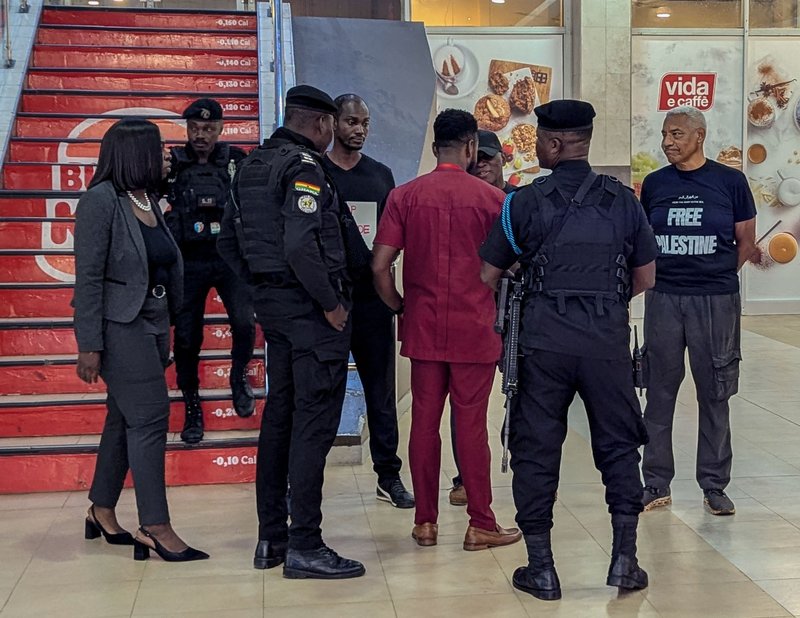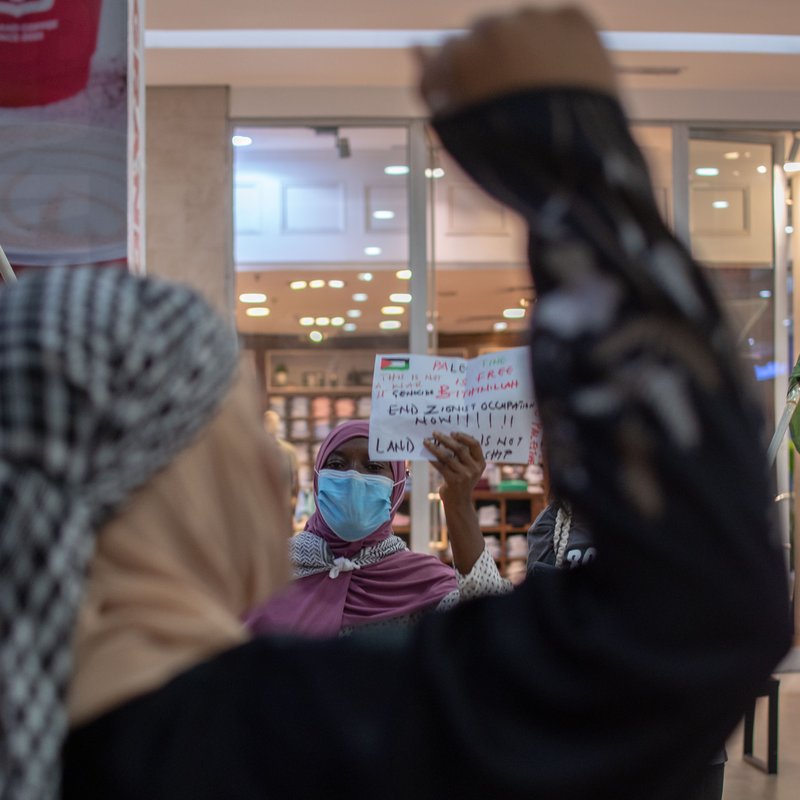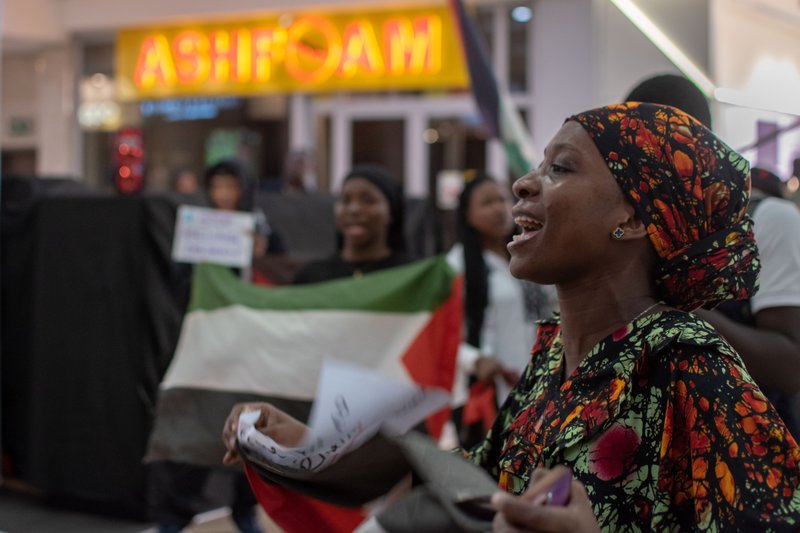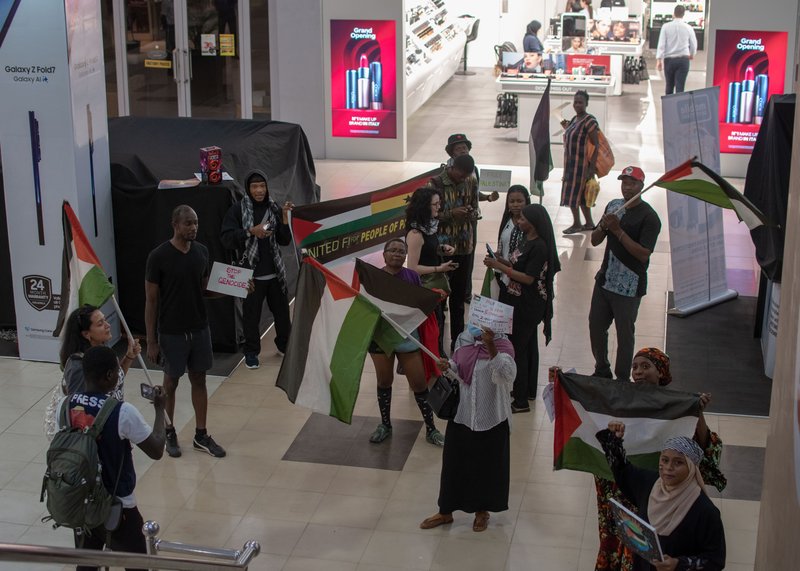This is a republished story from openDemocracy
The heavy security leading to Silverbird Cinema in the Accra Mall was the first thing cinemagoers noticed. Over a dozen police officers stood, mostly in pairs and all armed with assault rifles, along the staircase running from the ground floor into the cinema.
Their presence in the normally peaceful shopping centre in the Ghanaian capital was so unusual that people stopped to stare.
The protesters, though, found the scene ironic.
“This is a typical representation of [Israel’s] violent approach,” said one, Amma Gyan (not her real name).
It was 16 September, the same day an independent UN commission found Israel to be committing genocide in Gaza.
Inside the cinema, an Israeli film festival was kicking off with an invite-only screening attended by the likes of Ghana’s opposition leader in Parliament, Alexander Afenyo-Markin, and the Israeli ambassador, Roey Gilad.
The festival would see five films shown over as many days, with the following four screenings open to and free for the general public.
openDemocracy understands the festival was paid for by the Israeli embassy in Accra, though the embassy refused to answer our questions on whether there were any other financial contributors, saying: “We do not have the permission of the sponsors to do that.”
Protests of the Event
Before the event started, a coalition of activists had urged Silverbird to cancel it in light of Israel’s war crimes. When their efforts failed, they announced on social media that they would protest it instead.
Every day for five days, 20 or so protesters clad mostly in black, some wearing keffiyehs, gathered to wave Palestinian flags by the mall’s stairs and elevator leading to the cinema.
They had been blocked from entering the cinema by police officers, some of whom wore uniforms bearing SWAT insignia, suggesting they were part of the Special Weapons and Tactics unit that handles high-risk situations.
The police presence, Gyan said, “reflects the Israeli government of today and the violence that it is inflicting on Palestinians and Arabs in Palestine”.
In a tense exchange, officers attempted to disperse the protesters, whom they flanked and questioned for not notifying authorities of their demonstration.
The activists admitted they had not done so, but maintained that this was not grounds for the police to end their protest.

Ghana abolished the need to obtain police permits for public demonstrations in 1993, although there remains a controversial law requiring protesters to notify police ahead of such actions.
This is sometimes weaponised by authorities, who come prepared to make arrests, for example, under the guise of curbing a ‘security threat’.
“These measures were purely precautionary,” said Israeli Embassy Press Officer, Joseph Appiah-Dolphyne of the outsized police presence, in a written response, “and not in response to any specific threat.”
With the police officers eventually backing down, the demonstrators continued their protest. Chants of “free Palestine” and “stop the genocide” could be heard ringing through the mall.
But Israel had a message of its own, too.
Inside the cinema, visible not only to festival attendees but to those seeing other films, were pop-up stands justifying its war on Gaza, including written accounts of violence inflicted on Israelis during Hamas’s 7 October 2023 attack, as well as photos of its aftermath and of the Israeli hostages taken that day.
What did Israel hope to achieve?
The festival, which showcased both Israeli and Ghanaian films, was not the first of its kind in Ghana. A smaller, three-day celebration of Israeli film was held at Silverbird Cinemas in 2013.
“In a world often divided by politics and conflict, the arts hold the power to build bridges, spark dialogue and highlight shared humanity,” Nitza Gilad, the culture attaché at the embassy, in a statement prior to the festival’s opening.
Echoing this, Appiah-Dolphyne, the embassy’s press officer explained, “The festival was scheduled as part of a broader initiative to foster cultural ties and was not intended to coincide with any specific political moment,” and that the embassy wanted to use film to show “diversity, creativity and humanity” in Israel.

The films that screened were made between the mid-2000s and early 2010s, and appeared to promote an empathy for foreign ideas or people.
One, Noodle, tells the story of an Israeli air hostess who goes above and beyond to care for an undocumented Chinese boy stranded in Israel.
Another, And Then She Arrived, focuses on the difference in the backgrounds of its two Israeli love interests, one of German descent and one of Kurdish descent.
Each film was preceded by a vibrant promotional video inviting tourists to Israel. At one point, the music video for Jerusalem, a 2010 song by Grammy-nominated Ghanaian musician Rocky Dawuni, was played, with Dawuni singing: “I can’t forget you, Jerusalem”.
The Israeli sentiment became more overt after the final film, The Wedding Plan, with the broadcasting of a goodwill message by the film’s lead, Noa Kohler, in which she called for peace ahead of the Jewish New Year on 22 September and the release of the remaining Israeli hostages held by Hamas.
This messaging was dismissed as whitewashing by Ernesto Yeboah, the founder of the Economic Fighters League, a non-partisan political movement that led the protests. Yeboah held that Israel was simply using the festival to “launder its bloodstained image”.
He added: “Our protest against the Israeli film festival at Silverbird was rooted in a political and moral stance against genocide, apartheid and the whitewashing of state crimes through cultural propaganda.”
Alon Liel, a former diplomat and former director general of Israel’s Foreign Ministry, believes the festival is part of Israel’s larger hasbara programme, which takes its name from a Hebrew word meaning ‘persuasion’ and is widely understood to be propaganda.
Liel said his country’s hasbara efforts since 7 October have been futile and “the dream of peace” is the only way to improve Israel’s image.
“Hasbara will not change our situation,” He said. “The only thing that will change the Israeli situation for the better is a change of policy, ending the war, pulling out of Gaza and starting negotiations.”
Mohamad Elmasry, a professor of media Studies at the Doha Institute for Graduate Studies in Qatar, agrees with the hasbara characterization, explaining that it has intensified in recent years, driven by “an unprecedented image crisis.”
“One dominant approach has been to set context for the 7 October 2023 attacks on Israel, and ignore Israel’s destruction of Gaza and aggression in the West Bank,” Elmasry said.
This plan has largely failed, he added, saying: “Most audiences see through the spin, and the result is often deeper resentment.”
The Israeli embassy denied the festival was propaganda, telling openDemocracy that it “was a pure culture event” – more of which “are coming”.
“The goal was to offer authentic stories that provoke thought and conversation, not to present a singular narrative,” the press officer, Appiah-Dolphyne explained.
Unease with Israel Association
The protesters not only wanted to call out Israel’s “whitewashing” but to embarrass the host of the festival. They said Silverbird cinemas – whom they called “Silverblood” in their chants – was as guilty as those providing bombs to drop on Gaza, and hoped that calling it out would cause the event to be cut short.
The cinema seemed spooked. An agitated member of its management came down and tried unsuccessfully to talk down the protesters. Senior employees of the mall also tried to stop the demonstration, which they told openDemocracy was bad for business and was disrupting other shops.

The festival may not have been called off, but the controversy surrounding the protest appeared to cause one of its sponsors to have second thoughts.
The Kempinski Hotel Gold Coast City, a five-star hotel in Accra that is part of the Switzerland-based Kempinski Hotels brand, which owns dozens of luxury hotels around the world, had been advertised as a partner of the festival on social media posts by the Israeli Embassy since at least 29 August.
But on the day the festival was due to start, the company issued a statement to local media in the Ghanaian capital denying its involvement with the embassy and requesting the removal of its name and logo from the festival’s promotional material.
The hotel’s name was not featured on any subsequent social media posts, although it could still be seen on the pre-produced banners, posters, and even the tickets for the screenings.

The hotel declined to offer any further comment when openDemocracy reached out for clarity on its affiliation with the event.
The state-run University of Media, Arts and Communication’s Institute of Film and Television – some of whose students’ films were being screened at the festival – was also advertised as a leading partner of the event.
But various representatives of the school conveyed unease at the association with the festival. Only one of the student filmmakers attended any of the screenings, while a faculty member, Sela Adjei, told openDemocracy that some at the school did not want any association with Israel because of its genocidal actions against Palestine, warning that “we’ll become complicit”.
“If the whole world is standing in solidarity with Palestine because of the unfair treatment by the Israeli government and its military, then what business do we have partnering for cultural activities and cultural events?” Adjei asked.
A spokesperson for the university, Nana Efua Rockson, said that “management met three or four times to discuss the best approach to participating in the festival” and ultimately decided that “we have no stance on what is going on in the global space”.
Many will consider this sentiment at odds with the social justice-oriented ethos of former Ghanaian prime minister Kwame Nkrumah, who established the school’s journalism institute in 1959.
Nkrumah wanted Ghana to produce journalists aware of political struggles abroad and actively involved in the emancipation of Africa at a time when most of the continent was still under colonial rule.
Asked how the school came to be involved with the festival, Rockson noted that it had signed a memorandum of understanding with the Israeli Embassy, but would not disclose further details. She emphasised that advancing its academic mandate was the school’s priority.
“We are a public institution here to promote academic excellence. So for us, any platform that gives us and our students the chance to showcase their work, we will take it,” she explained.
The student shorts provided by the school for screening were dramas that had themes like mental illness, faith, and even marital infidelity.
Other sponsors of the event included Israeli construction firm Rolider Ghana Limited; the Accra-based EON Engineering Solutions, whose two founding partners are Israeli; the STL Amandi Foundation, the charitable arm of a Ghanaian tech company whose CEO and business director are Israeli; and Sienna Services, an engineering and construction company operating in West Africa.
None of the companies responded to openDemocracy’s request for comment at the time of publishing.
For Silverbird, its association with the festival “was purely business”. The company’s business manager, Nana Yaw Twum Barima Yeboah, told openDemocracy that the cinema chain had a contract with the Israeli embassy and was being paid.
“If Palestine comes here tomorrow,” he added, “I will host them and take their money.”
Twum also pointed out that Silverbird has held similar events under the banner of various consulates in the past. “The UK high commissioner has been here. The American consul has been here. The Indian high commissioner has been here; Peru, Mexico, Brazil, Colombia, Spain, a host of them,” he said.
But protestors believe this argument is not good enough, saying Israel’s actions in Gaza mean it must be met with greater moral fortitude.
“Tens of thousands of civilians are being killed,” said Gyan. “I am not proud to be a Ghanaian citizen if Israel is allowed to carry on as if it is business as usual, because it is not.”





